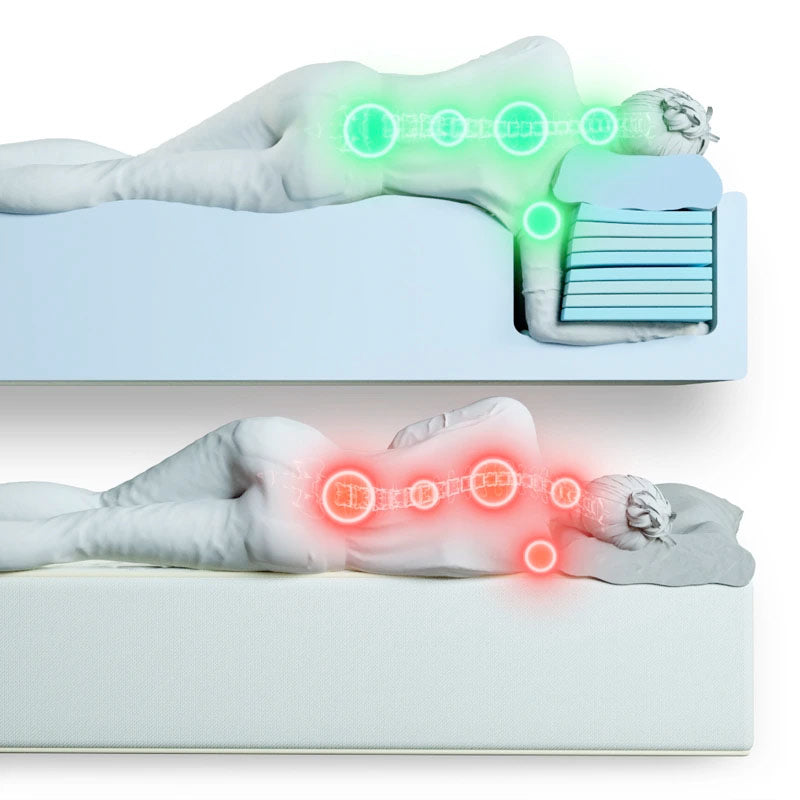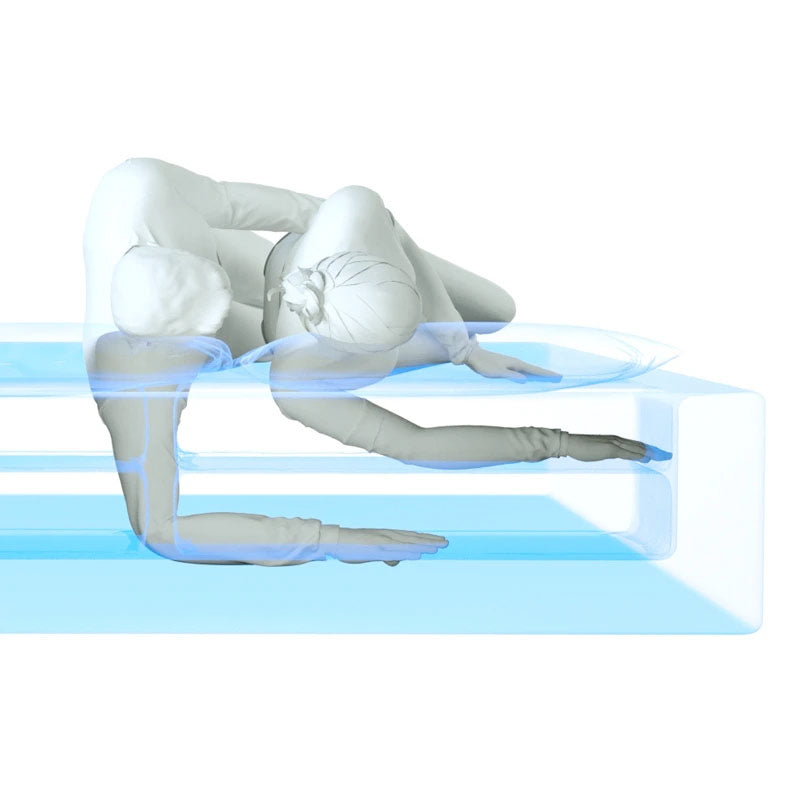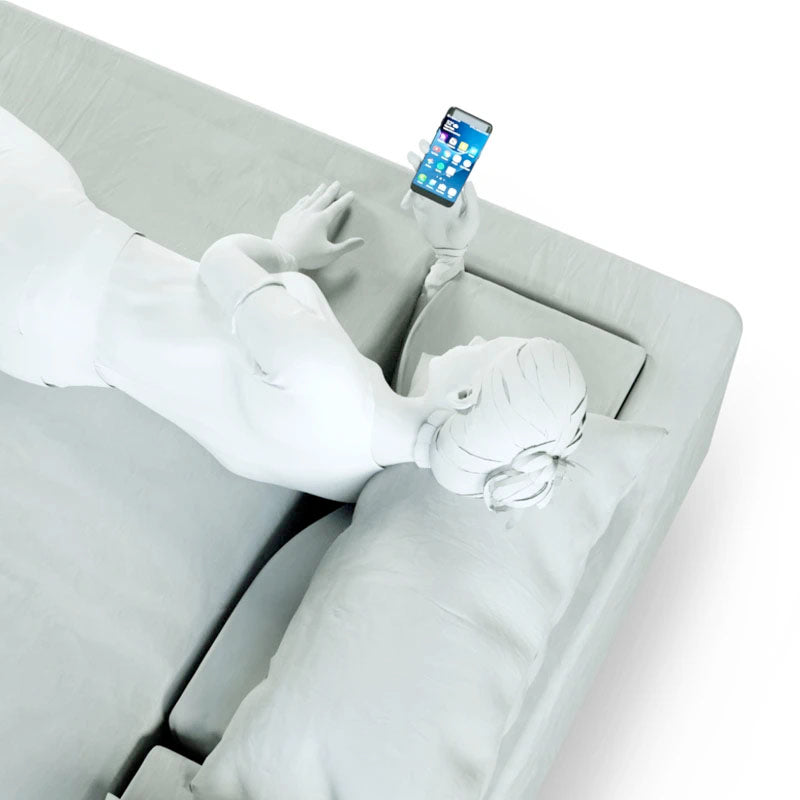Is it possible to sleep too much? According to medical experts, yes.
It’s common knowledge that not getting enough sleep can negatively affect your health. But what if you get more sleep than is recommended? As it turns out, sleeping too much can affect your health, mood, and overall disposition. Sleeping too much can even make you sick.
In a study of 24,000+ people aged 15 to 85, 2.7% were considered long sleepers. These people get more than the recommended average amount of sleep. They also tended to be female, between the ages of 15 and 25 or 65 or older. These sleepers were also considered to be at risk for certain health conditions.
For years, experts have touted eight hours of sleep per night as the recommended amount for most people. However, some people sleep more than that.
Are you an oversleeper? Do you want to stop oversleeping but don’t know how. Stay tuned to learn seven tips that can help you stop oversleeping — and how a SONU mattress can help.
What Is Oversleeping?
Oversleeping is when someone sleeps for more than nine hours within 24 hours. It is also known as long sleeping. If you oversleep and are excessively sleepy during daylight hours, you might be suffering from a condition known as hypersomnia.
Some symptoms of oversleeping include taking too many daily naps, experiencing excessive daytime sleepiness, and having recurring headaches. Even waking up too many times per night can signify that someone has hypersomnia.
Other symptoms of oversleeping include:
- Memory problems
- Changes in mood
- Decreased energy
No two people need the same amount of sleep. Someone who is physically active might require more hours of sleep than someone who is sedentary. Adults typically need less sleep than children do. The right amount of sleep each person needs depends on their bodies.
To diagnose oversleeping, sleepers may be asked to undergo sleep studies, keep sleep diaries, or fill out a survey that rates their level of sleepiness.
Why Do People Oversleep?
People oversleep for a lot of different reasons. Some may have underlying medical issues, or they may be struggling with a sleep disorder.
Medical reasons for oversleeping can include:
- Sleep apnea: The sleeper temporarily stops breathing while sleeping. They may snore, gasp for air, or feel extremely tired the next day.
- Narcolepsy: The sleeper feels excessively tired during the day and experiences sleep attacks, which are periods when they fall asleep unintentionally.
- Hypersomnia: This condition occurs when people have difficulty waking up, experience excessive sleepiness, and do not feel like they got enough sleep. A person with hypersomnia might sleep for up to 18 hours a day.
- Hypothyroidism: Hypothyroidism is caused by an underactive thyroid, which does not produce important hormones that the body needs. It can cause some people to oversleep. Other symptoms include bulging eyes or changes in vision.
- Anxiety: Anxiety is characterized by excessive and persistent worrying about common situations. It has been linked to sleep issues, including sleeping too much, having trouble falling asleep, and struggling to stay asleep.
- Depression: This mood disorder negatively affects how someone acts, thinks, and feels. Approximately 15% of people with depression oversleep.
- Multiple sclerosis (MS): MS affects the brain and spinal cord. It can be extremely disabling, causing damage to nerves and affecting mobility. Some people with MS experience dizziness, slurred speech, and fatigue.
- Kleine-Levin syndrome: This disorder is rare. A person has Kleine-Levin syndrome when they need to oversleep. The disorder can also affect their sex drive and appetite.
Not everyone who oversleeps has an underlying illness. Some people oversleep because they drink too much alcohol or are experiencing the side effects of prescription medications or recreational drugs.
Why Is Oversleeping Bad?
Oversleeping can put people at risk for developing other health conditions, like diabetes or heart disease. It is just as bad as sleep deprivation. There is also a connection between oversleeping and high mortality risk.
People who oversleep could also end up struggling to control their body weight. Some people who oversleep are at higher risk of becoming obese. Oversleepers are at risk for type 2 diabetes, heart disease, mood disorders, and chronic headaches.
People with a history of depression in their families are at higher risk for developing the disorder if they oversleep.
Oversleeping can be dangerous. Oversleeping or excessive sleepiness can cause drivers to be impaired, which can lead to road accidents.
It is necessary to get quality sleep each night to not only feel well-rested but also function normally the next day. Consequences of oversleeping like brain fog and fatigue make people more vulnerable to making mistakes and impairment.
What Is the Right Amount of Sleep?
The right amount of sleep varies by age group and lifestyle. Check the chart below to see where you and your loved ones fall.
|
Age Group |
Minimum Amount of Sleep |
|
|
Newborn |
0-3 months |
14 |
|
Infant |
4-11 months |
12 |
|
Toddler |
1-2 years |
11 |
|
Preschool |
3-5 |
10 |
|
School age |
6-13 years |
9 |
|
Teen |
14-17 years |
8 |
|
Young adult |
18-25 years |
7 |
|
Adult |
26-64 years |
7 |
|
Older adult |
65 years+ |
7 |
On average, adults need seven hours of sleep per night. So, how much sleep is too much?
Some adults require more than the average seven hours of sleep. These people are known as long sleepers, and they get about 10 hours of sleep or more per night. Being a long sleeper might actually be genetic.
However, the average person is not a long sleeper. If the average person oversleeps by nine hours or more but still feels run-down the next day, their health might be to blame.
If you are left feeling run-down due to oversleeping and think your bed might be to blame, SONU’s mattresses can help you get the right amount of sleep to wake up feeling refreshed. Head on over to SONU and check out the negative space mattress, the first bed to come with a revolutionary, patented Comfort Channel that sleepers are raving about.
How Do You Stop Oversleeping?
If you are prone to oversleeping, there are ways you can try to stop it. It all starts with practicing sleep hygiene. Keep reading to discover which sleep hygiene tactics you could use to stop yourself from oversleeping.
1. Get a Better Mattress
If you wake up each day feeling like you didn’t get enough sleep, your mattress could be the culprit. Older mattresses were not designed with the sleeper’s needs in mind – they tended to be too flat, unsupportive, and even painful to sleep on.
That’s not the case with modern mattresses like SONU’s. SONU’s mattresses help you wake up feeling refreshed. They were made with several layers of memory foam topped off with Serene foam, a new, cooling, and body cradling material. Each mattress even comes with a never-before-seen, patented Comfort Channel that allows you to fully immerse into the mattress, creating a full range of motion.
2. Adopt a Regular Sleep Schedule
Circadian rhythm describes the 24-hour cycle that people experience natural processes, including sleep. Humans naturally want to wake up when the sun comes up and go to bed when the sun goes down. Aligning oneself with circadian rhythm is a good way to develop a sleep schedule.
Figure out exactly how much sleep you need, then schedule a bedtime and wake time. Going to bed and rising at regular times each day help your body adapt to normal sleep patterns. You’ll start to feel tired around your scheduled bedtime and ready to get up at your scheduled waketime.
3. Set the Scene
Creating an ambient bedroom is important for helping you fall asleep at a regular time each night. Ensure your room temperature is set to one that helps induce sleep and remove all technology emitting blue light. Instead of doing it each night, set your alarm so that it automatically goes off at the same time each morning.
Using blackout curtains, earplugs, or soft background noise can also help a person fall asleep and stay that way. Getting in the habit of sleeping in a calming environment can help them get sleep that rejuvenates the body.
4. Don’t Hit Snooze
Speaking of your alarm, avoid the urge to hit snooze when it goes off in the morning. Get out of bed. To help yourself get used to it, create an enticing morning routine. That routine might include rewarding yourself with a cup of coffee when you get up or allowing yourself to watch a little television. You want to entice yourself to get up by having something to look forward to in the morning.
5. Workout Regularly
Working out regularly conditions your body to feel energized and feel tired at similar times each day. Including your workout as part of your morning routine can help wake you up and provide you with enough energy to start your day. Eventually, as the day goes on, your body will start to grow tired until you eventually go to bed.
6. Keep a Sleep Journal
Keeping track of your sleep habits is a good way to assess your sleep patterns and determine what changes you need to make. In your sleep journal, note when you go to bed and get up. If you woke up at any point during the night, write that in your journal too. Make notes about everything from your mood to whether you took any sleep supplements.
7. Talk to a Doctor
If oversleeping persists after trying the previous tips, make an appointment with your doctor. You could have a health condition that is causing you to oversleep. A doctor will advise which changes need to be made to stop you from oversleeping. They may even refer you for a sleep study.
If you feel like it’s impossible to control your oversleeping, try these suggestions. Avoiding stimulants like alcohol or caffeine can also help your body adapt to a normal sleep schedule.
Conclusion
There are several possible reasons that people oversleep. Doing so consistently can lead to problems with mental or physical health. Whether you have a sleep disorder or are struggling with an illness, there are ways to stop yourself from oversleeping.
You can change your oversleeping habits by making changes to your lifestyle. The best way to stop oversleeping is to practice good sleep hygiene. To kick your sleep hygiene routine off right, you might need to change your bed.
Let SONU Sleep help you say goodbye to traditional mattresses. SONU’s mattresses were made to ensure that you’re well-rested so that you wake up full of energy and ready to take on the day.
Transform your sleep. Upgrade to the SONU Sleep System.
Sources:
Is It Possible to Get Too Much Sleep? | sleep.org
Causes and Effects of Oversleeping | Sleep Foundation
How to Stop Oversleeping | Sleep Zone
Hypothyroidism symptoms: Can hypothyroidism cause eye problems? - Mayo Clinic
What You Should Know About the Relationship Between Oversleeping and Depression | Cleveland Clinic
Kleine-Levin Syndrome | NORD (National Organization for Rare Disorders).






















